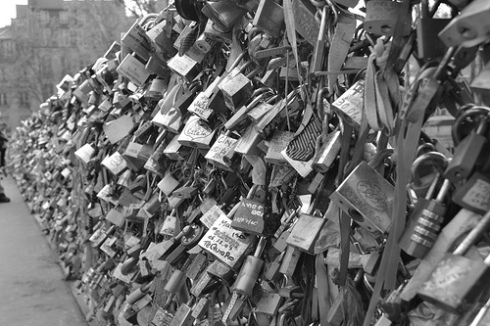When something bad happens I want to talk to her. When something good happens I want to tell her. When I need advice I want to ask her. She helped prepare me for my job interview (I got the job), gave me advice on contraception, told me how much to contribute to my pension, showed me where to get a good haircut when I couldn’t go to my usual place. I want her to be at my birthday party, at my club night, everywhere.
I don’t know, maybe I lucked out with Hannah [name has been changed for some semblance of privacy] – maybe another like her won’t turn up again. But either way, I’m so, so glad she did, because in one go, I learned everything I needed to know about the life-altering benefits of being friends with your partner’s partner.
You can’t force things, and I believe you should reserve every right to not like your partner’s partner. You’re under no more obligation to them than any other human. But especially when you’re both women, the fact remains that we’ve been so deeply socialised to view other women as threatening, negative forces on your position – especially your position in a relationship – that it’s almost a miracle if you can come up with a better situation than that. And I’m so glad we did.
In a weird twist of fate, the first time we spoke was as a result of this blog. I wrote a post about that very thing – the unfortunate experience by feeling pushed out by another one of my boyfriend’s (mercifully short-lived) then-partners (compounded by the fact she was also a certifiably terrible person; with hindsight I should have had no qualms about posting it). Hannah messaged me to say she saw no reason why we wouldn’t get along, and that she didn’t want us to fall into the same dynamic of weird passive-aggression that had arisen with the other partner.
The funny thing is, in the beginning we were struck by parallel but opposing fears. She thought ‘how can I compete with her? She’s been around much longer than I have, they have an established relationship; how do I work with this?’ while I was thinking ‘how can I compete with her? She’s shiny and new and fun and I’ll just become irrelevant.’ We both found our own ways to be threatened by each other.
Things weren’t always easy or fun for us. We had some rocky patches in the beginning, possibly motivated by old, hard-wired feelings of jealousy and insecurity, throwbacks to old relationships and old lives. Possibly some situations were mis-managed by our partner. But it was almost those that made it possible for us to be friends: to see that each other hurt, and was human, and needed things, and could feel weak. To know that we weren’t just perfect, ruthless, heartless super-women who never got sad and never got anxious and never got insecure meant that there was some basic common ground. It meant we could trust each other, in a way.
We would hang out without our boyfriend, and hardly ever talk about him. We’d talk about loads of other stuff, like tattoos and films and politics and OkCupid. I don’t remember if we studiously avoided him or if we just had too much other stuff to talk about to devote much time to him.
Getting to know her showed me, in hyperfocus, everything that’s good about female friendship. All of the bits that are selfless and unguarded and hysterically funny and heartbreakingly, life-changingly sad. Even when we didn’t know each other well, and had only met a couple of times, we still found it in ourselves to talk through painful, challenging feelings and experiences and create solutions that showed respect and love.
Essentially, a friendship between us was facilitated by a mutual romantic relationship. It sounds simple and sort of obvious, but it seems as if society expects so little of women as to make that impossible. Whenever I would mention her in conversation, friends who didn’t know her, or perhaps, friends who didn’t know me very well, would try to prod it out of me that I secretly hated her. That, or they wanted to know if we had threesomes. We never did either of those, in case you were wondering.
We’re both great women, and in the most basic sense, a really great man should bring us together rather than drive us apart. There’s no logical reason that that particular ‘shared interest’ should be a minefield, rather than a flowerbed. In the beginning, our common ground was someone I love so deeply and so wholeheartedly, and that’s a pretty great place to begin, right? It grew and changed into more than that, and I don’t know at what point it stopped being about him and started being about us.
My friendship with her has outlasted her relationship with him. But I’m no consolation prize; she and I are the real deal. “Relationships should always be about bringing out the best in people,” she wrote in her first message to me (which she probably doesn’t remember, I just dug around for it). True. Her relationship with my boyfriend brought out the best in all of us. To call it a rare gift in a harsh world feels like an understatement.







